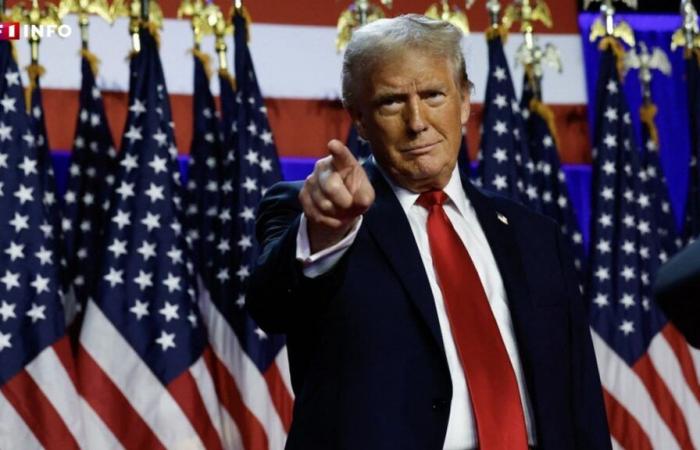A user of Polymarket, an online betting platform, made $85 million in profits from a series of bets on Donald Trump's victory.
He is a Frenchman who calls himself “Théo”, having previously lived in the United States and worked as a trader for banks.
Contacted by the “Wall Street Journal”, “Théo” confirmed having made a profit of around 80 million euros.
Follow the full coverage
US presidential election
An $85 million jackpot. A user of the Polymarket platform, an offshore betting platform launched in 2020 on which one can only bet in cryptocurrencies, made more than 80 million euros in profits thanks to a series of bets on the victory of Donald Trump in the American presidential election, the company Chainalysis told AFP on Wednesday.
This French national visited a popular market in Polymarket, titled “Presidential Election Winner 2024”. This invited bettors to place their shares on the winner of the American presidential election (new window)on November 5. Concretely, Internet users bet by buying shares for Donald Trump or Kamala Harris. Until the results of the vote, the share price varied according to the probability of victory of each candidate. If Polymarket resembles “classic” betting sites, on the other hand, to bet, users must buy shares which they pay for in USD Coin, a stable cryptocurrency pegged to the dollar.
A bet of 70 million dollars
According to the Wall Street Journal, (new window) the Frenchman who won $85 million calls himself Théo and did not want to publicly reveal his last name. “My goal is just to make money.”declared this man to a journalist from the American economic and financial daily. He described himself as a Frenchman who previously lived in the United States and worked as a trader for banks.
On October 24, Polymarket indicated to New York Times (new window)that a French bettor having “Extensive trading experience and background in financial services” had placed considerable sums on the election of the Republican candidate to the White House. Specialized in the analysis of cryptocurrency transactions (new window)Chainalysis carried out cross-references and identified 11 accounts with similar characteristics. They were fed at the same time, made bets at the same time, and were emptied simultaneously, according to data collected and cross-referenced by Chainalysis. The player bet some $70 million in total on the victory of the Republican candidate, ultimately recovering this sum, as well as an additional $85 million. Contacted by Wall Street Journal“Théo” confirmed that he had indeed made a profit of this amount.
A platform (in theory) prohibited to Americans
The way Polymarket works is based on questions that users answer by betting on “yes” or “no”. “Théo” thus multiplied the bets on several questions, such as “Will Donald Trump win the presidential election?” or “Will Donald Trump win the election in Pennsylvania?” “Theo” predicted that six of the seven key states, or “swing states” would be won by the Republican candidate. Like other betting sites, Polymarket gave Donald Trump a marked advantage before the election, contradicting polls that put him neck and neck with Democratic candidate Kamala Harris.
-
Read also
Polls, victory projections… The American presidential election between uncertainties and risks of manipulation
Although based in New York, and despite the enthusiasm it arouses, this self-proclaimed platform “largest prediction site in the world” is theoretically prohibited to American residents. Punters are therefore theoretically from outside the country, unless they circumvent this ban, in particular through a VPN. In the United States, there is legal uncertainty surrounding electoral betting, which was widespread until the 1930s, with a presence on Wall Street as well as in the political pages of newspapers, before regulation and public opinion precipitated their end.






